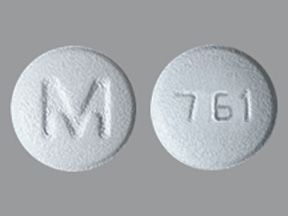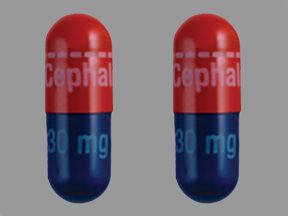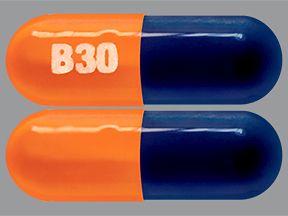- Cyclobenzaprine oral tablet is available as both a generic and brand-name drug. Brand name: Fexmid.
- Cyclobenzaprine also comes as an extended-release capsule that you take by mouth.
- Cyclobenzaprine oral tablet is used to help relieve muscle spasms. It’s used along with rest and physical therapy. It should only be used for 2 to 3 weeks at a time.
Cyclobenzaprine oral tablet is a prescription drug that’s available as the brand-name drug Fexmid. It’s also available as a generic drug. Generic drugs usually cost less than the brand-name version. In some cases, they may not be available in all strengths or forms as the brand-name drug.
Cyclobenzaprine also comes as an oral extended-release capsule.
Why it’s used
Cyclobenzaprine oral tablet is used to help relax muscles. It helps relieve pain, stiffness, or discomfort caused by strains or injuries to your muscles. It’s used along with rest and physical therapy. It should only be used for 2 to 3 weeks at a time.
Cyclobenzaprine may be used as part of combination therapy. This means you may need to take it with other medications.
Learn more about muscle relaxing medications.
How it works
Cyclobenzaprine belongs to a class of drugs called muscle relaxants. A class of drugs is a group of medications that work in a similar way. These drugs are often used to treat similar conditions.
It isn’t known exactly how this drug works to relax your muscles. It may decrease the signals from your brain that tell your muscles to spasm.
Cyclobenzaprine oral tablet may cause drowsiness and dizziness. This is more likely to happen in the few hours after you take it. It can also have other side effects.
More common side effects
The more common side effects of cyclobenzaprine can include:
- dry mouth
- dizziness
- fatigue
- constipation
- drowsiness
- nausea
- heartburn
If these effects are mild, they may go away within a few days or a couple of weeks. If they’re more severe or don’t go away, talk with your doctor or pharmacist.
Serious side effects
Call your doctor right away if you have serious side effects. Call 911 if your symptoms feel life threatening or if you think you’re having a medical emergency. Serious side effects and their symptoms can include the following:
- Heart problems. Symptoms can include:
- fainting
- heart palpitations (fast or irregular heartbeat)
- confusion
- trouble speaking or understanding
- loss of control or numbness in your face, arms, or legs
- trouble seeing in one or both eyes
- Serotonin syndrome. Symptoms can include:
- agitation (a feeling of aggravation or restlessness)
- hallucinations (hearing or seeing something that isn’t there)
- seizures
- nausea
Disclaimer:
Our goal is to provide you with the most relevant and current information. However, because drugs affect each person differently, we cannot guarantee that this information includes all possible side effects. This information is not a substitute for medical advice. Always discuss possible side effects with a healthcare professional who knows your medical history.
Cyclobenzaprine oral tablet can interact with other medications, vitamins, or herbs you may be taking. An interaction is when a substance changes the way a drug works. This can be harmful or prevent the drug from working well.
To help avoid interactions, your doctor should manage all of your medications carefully. Be sure to tell your doctor about all medications, vitamins, or herbs you’re taking. To find out how this drug might interact with something else you’re taking, talk with your doctor or pharmacist.
Examples of drugs that can cause interactions with cyclobenzaprine are listed below.
Drugs you should not take with cyclobenzaprine
Do not take monoamine oxidase inhibitors (MAOIs) with cyclobenzaprine. Doing so can cause dangerous effects on the body. Examples of these drugs include:
- selegiline
- rasagiline
- tranylcypromine
Taking this drug with an MAOI or within 14 days of stopping an MAOI could increase your risk of serious side effects. These include seizures.
Interactions that increase your risk of side effects
Taking cyclobenzaprine with certain medications raises your risk of side effects from cyclobenzaprine. This is because the amount of cyclobenzaprine in your body is increased. Examples of these drugs include:
- Benzodiazepines, such as triazolam, alprazolam, and midazolam. You may have more sedation and drowsiness.
- Barbiturates, such as phenobarbital. You may have more sedation and drowsiness.
- Drugs used to treat depression. These include fluoxetine, venlafaxine, amitriptyline, or bupropion. You may be at a greater risk for serotonin syndrome.
- Anticholinergic drugs, such as tolterodine or oxybutynin. You may be at a greater risk for certain side effects. These include dry mouth or not being able to urinate.
Interactions that can increase the effect of cyclobenzaprine
When certain drugs are used with cyclobenzaprine, they may cause more severe side effects such as increased drowsiness or sedation. A person should ask their doctor whether it is safe to combine another medication with cyclobenzaprine and take care not to operate any machinery while taking it.
Disclaimer: Our goal is to provide you with the most relevant and current information. However, because drugs interact differently in each person, we cannot guarantee that this information includes all possible interactions. This information is not a substitute for medical advice. Always speak with your healthcare professional about possible interactions with all prescription drugs, vitamins, herbs and supplements, and over-the-counter drugs that you are taking.
This dosage information is for cyclobenzaprine oral tablet. All possible dosages and drug forms may not be included here. Your dosage, drug form, and how often you take the drug will depend on:
- your age
- the condition being treated
- how severe your condition is
- other medical conditions you have
- how you react to the first dose
Forms and strengths
Generic: Cyclobenzaprine
- Form: Oral tablet
- Strengths: 5 mg, 7.5 mg, 10 mg
Brand: Fexmid
- Form: Oral tablet
- Strengths: 7.5 mg
Dosage for relief of muscle spasms
Adult dosage (ages 18–64 years)
5–10 mg taken 3 times per day.
Child dosage (ages 15–17 years)
5–10 mg taken 3 times per day.
Child dosage (ages 0–14 years)
Cyclobenzaprine should not be used in people younger than 15 years.
Senior dosage (ages 65 years and older)
The kidneys of older adults may not work as well as they used to. This can cause your body to process drugs more slowly. As a result, more of a drug stays in your body for longer. This raises your risk of side effects. Your doctor may start you on a lowered dose or a different dosing schedule. This can help keep levels of this drug from building up too much in your body.
Special dosage considerations
For people with liver problems: If your liver problems are mild, your doctor may start you on a lowered dose or a different dosing schedule. This can help keep levels of this drug from building up too much in your body. You shouldn’t use this drug if your liver problems are moderate or severe.
Disclaimer: Our goal is to provide you with the most relevant and current information. However, because drugs affect each person differently, we cannot guarantee that this list includes all possible dosages. This information is not a substitute for medical advice. Always speak with your doctor or pharmacist about dosages that are right for you.
Cyclobenzaprine oral tablet is used for short-term treatment. You should not use this drug for more than 3 weeks. Cyclobenzaprine comes with risks if you don’t take it as prescribed.
If you stop taking the drug suddenly or don’t take it at all: Your symptoms may get worse. You may have more muscle spasms or pain.
If you miss doses or don’t take the drug on schedule: Your medication may not work as well or may stop working completely. For this drug to work well, a certain amount must be in your body.
If you take too much: You could have dangerous levels of the drug in your body. Symptoms of an overdose of this drug can include:
- fainting
- heart palpitations (fast or irregular heartbeat)
- confusion
- trouble speaking or understanding
- loss of control or numbness in your face, arms, or legs
- trouble seeing in one or both eyes
- agitation (a feeling of aggravation or restlessness)
- hallucinations (hearing or seeing something that isn’t there)
- seizures
- nausea
Call your doctor or local poison control center if you think you’ve taken too much of this drug. Call 911 or go to the nearest emergency room immediately if your symptoms are severe.
What to do if you miss a dose: Take your dose as soon as you remember. But if you remember just a few hours before your next scheduled dose, take only one dose. Never try to catch up by taking two doses at once. This could result in dangerous side effects.
How to tell if the drug is working: You should have less muscle pain and stiffness.
As with all medications, the costs of cyclobenzaprine can vary.
Consider these considerations if your doctor prescribes cyclobenzaprine oral tablet for you.
General
- You can take cyclobenzaprine with or without food.
- Take this drug at about the same time each day.
- You can cut or crush the tablet.
- Not every pharmacy stocks this drug. When filling your prescription, be sure to call ahead to make sure your pharmacy carries it.
Storage
- Store cyclobenzaprine at 77°F (25°C).
- Keep it away from light.
- Don’t store it in moist or damp areas, such as bathrooms.
Refills
A prescription for this medication is refillable. You should not need a new prescription for this medication to be refilled. Your doctor will write the number of refills authorized on your prescription.
Travel
When traveling with your medication:
- Always carry your medication with you. When flying, never put it into a checked bag. Keep it in your carry-on bag.
- Don’t worry about airport X-ray machines. They can’t hurt your medication.
- You may need to show airport staff the pharmacy label for your medication. Always carry the original prescription-labeled box with you.
- Don’t put this medication in your car’s glove compartment or leave it in the car. Be sure to avoid this when the weather is very hot or cold.
Clinical monitoring
If you have liver problems, your doctor may do a blood test to monitor how well your liver is working while you take this drug.
Insurance
Many insurance companies require prior authorization for this drug. This means your doctor will need to get approval from your insurance company before your insurance company will pay for the prescription.
There are other drugs available to treat your condition. Some may be better suited for you than others. Talk with your doctor about other drug options that may work for you.
- Serotonin syndrome warning: This drug can cause a life threatening condition called serotonin syndrome. This happens when medications cause too much serotonin to build up in your body. Call your doctor right away if you have any symptoms of this condition. These include agitation (a feeling of aggravation or restlessness), hallucinations (seeing or hearing something that isn’t there), seizures, or nausea. Your risk may be higher if you take cyclobenzaprine with other drugs that increase the risk of serotonin syndrome, such as antidepressants.
- Effects on the heart warning: This drug may cause heart arrhythmias (heart rate or rhythm problems). Your risk may be higher if you take a drug to treat depression or if you already have heart problems. If these issues aren’t treated, they can lead to a heart attack or stroke.
Central nervous system warning: This drug can cause drowsiness, dizziness, hallucinations (seeing or hearing things that aren’t there), and delusions (believing things that aren’t true). You should not drive or use machinery while you’re on this medication until you know how it affects you. Your risk may be higher if you’re 65 years or older.
Cyclobenzaprine oral tablet comes with several warnings
Allergy warning
Cyclobenzaprine can cause a severe allergic reaction. Symptoms can include:
- trouble breathing
- swelling of your throat or tongue
Call your doctor or local poison control center immediately if you have an allergic reaction. Call 911 or go to the nearest emergency room if your symptoms are severe. Do not take this drug again if you’ve ever had an allergic reaction to it. Taking it again could be fatal (cause death).
Alcohol interaction
Using drinks containing alcohol can increase your risk of dizziness, drowsiness, and decreased alertness from cyclobenzaprine. If you drink alcohol, talk with your doctor.
Warnings for people with certain health conditions
For people with trouble urinating: This drug can make your symptoms worse.
For people with glaucoma: This drug can make your symptoms worse.
For people with liver problems: If you have liver problems or a history of liver disease, you may not be able to clear this drug from your body well. This may cause it to build up in your body. This raises your risk of side effects.
Warnings for other groups
For pregnant people: Speak with your doctor if you’re pregnant or planning to become pregnant.
- Research in animals hasn’t shown a risk to the fetus when the mother takes the drug.
- There aren’t enough studies done in humans to show if the drug poses a risk to the fetus.
Animal studies don’t always predict the way humans would respond. Therefore, this drug should only be used in pregnancy if clearly needed.
People who are breastfeeding or chestfeeding: Cyclobenzaprine may pass into breast milk and may cause side effects in a child who is nursing. Talk with your doctor if you are nursing your child. You may need to decide whether to stop nursing or stop taking this medication.
For seniors: The kidneys and liver of older adults may not work as well as they used to. This can cause your body to process drugs more slowly. As a result, more of a drug stays in your body for longer. This raises your risk of side effects.
For children: The oral tablet shouldn’t be used in people younger than 15 years.
Disclaimer: Medical News Today has made every effort to make certain that all information is factually correct, comprehensive, and up to date. However, this article should not be used as a substitute for the knowledge and expertise of a licensed healthcare professional. You should always consult your doctor or another healthcare professional before taking any medication. The drug information contained herein is subject to change and is not intended to cover all possible uses, directions, precautions, warnings, drug interactions, allergic reactions, or adverse effects. The absence of warnings or other information for a given drug does not indicate that the drug or drug combination is safe, effective, or appropriate for all patients or all specific uses.





